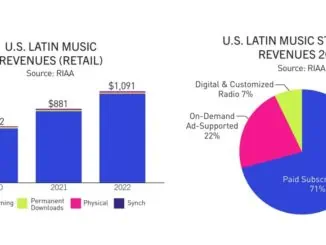
Music revenues in Europe are 39% below 2001 levels according to a recent report by IFPI, the organisation representing record companies worldwide, which looked at recorded music in the European Union. The report, Music in the EU: A Global Opportunity, explores the ways in which the work and investment of record companies is helping to drive the success of European music and artists, both domestically and internationally, whilst providing insight into the challenges and opportunities for maintaining and enhancing the EU’s position in today’s global music ecosystem. With other regions across the world seeing rapid growth and development, the report sets out how EU policymakers can help secure a positive future for music at what is a pivotal time for music in Europe.
Key highlights
- The EU is a globally important place for music but there is room for further growth.
- Annual recorded music revenues in 2023 were €5.2 billion – greater than Japan (€2.5bn), the UK (€1.7bn) and China (€1.3bn)
- If adjusted for inflation, EU recorded music revenues in 2023 were only 61% of where they were in 2001 (the industry’s revenue peak)
- Record label investment has a positive ripple effect across the European music industry and provides a boost to EU GDP contributions
- Every €1 directly generated or invested by record companies leads to an additional €1.80 GDP contribution to other parts of the music sector value chain
- Domestic artists are relatively more successful in Europe however, the EU risks falling behind in what is the most competitive global market ever
- In the 22 EU markets where IFPI collects yearly chart data, on average, 60% of the Top 10 singles were tracks by domestic artists – compared to only 47% in non-EU markets
- US artists lead global Top 10 single exports, with Latin and Central American artists also performing well
In its report IFPI suggests how EU institutions could support a thriving music sector and the development of responsible and ethical AI by:
- Pre-empting any national initiatives that could jeopardise the functioning of the Digital Single Market and the ability of the music industry to grow and evolve dynamically
- Stopping AI companies’ unauthorised ingestion of copyright protected content
- Fully enforcing the EU’s intellectual property rules across Europe
Music in the EU: A Global Opportunity (15pp) is freely available and can be downloaded here.




